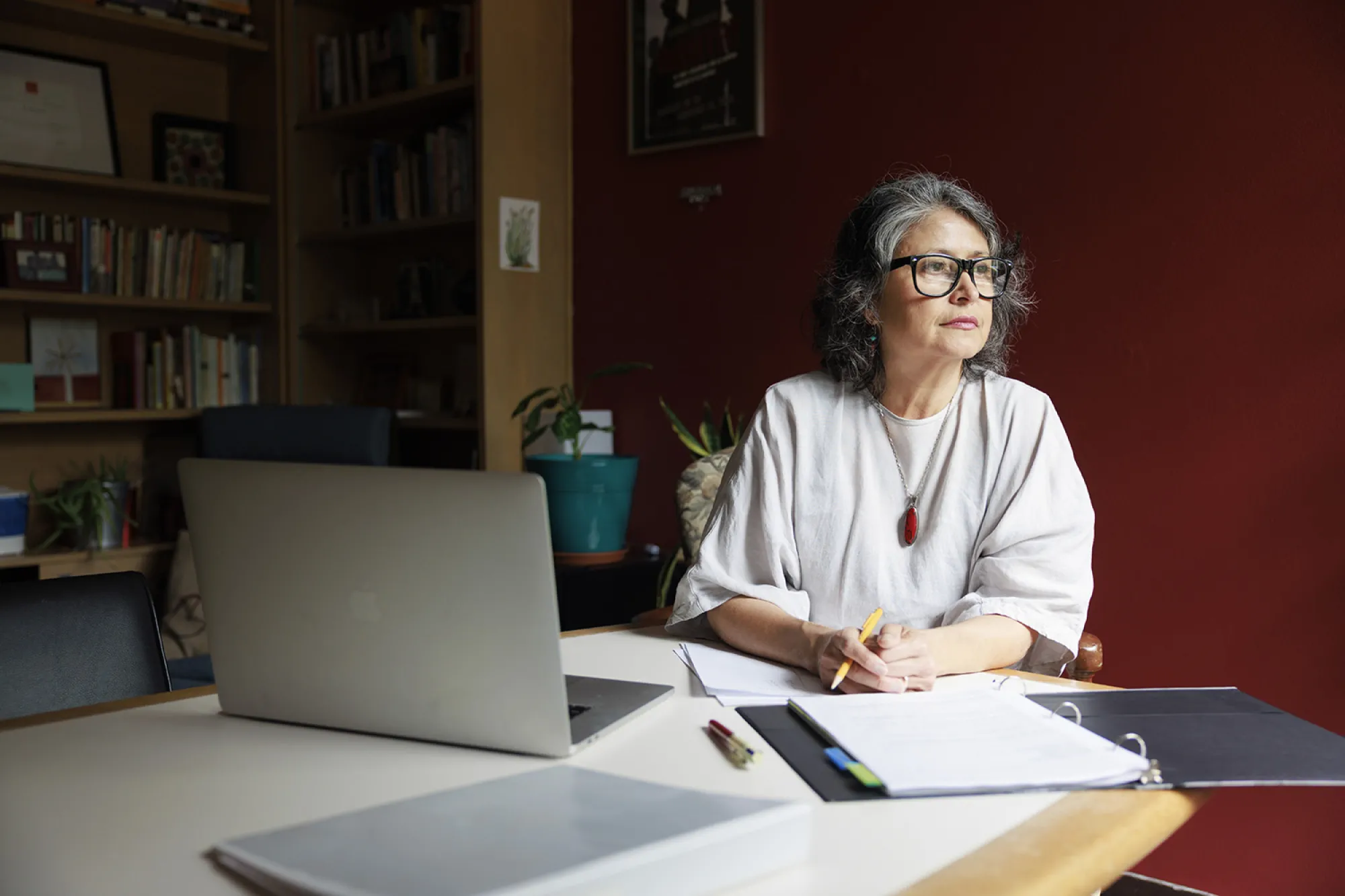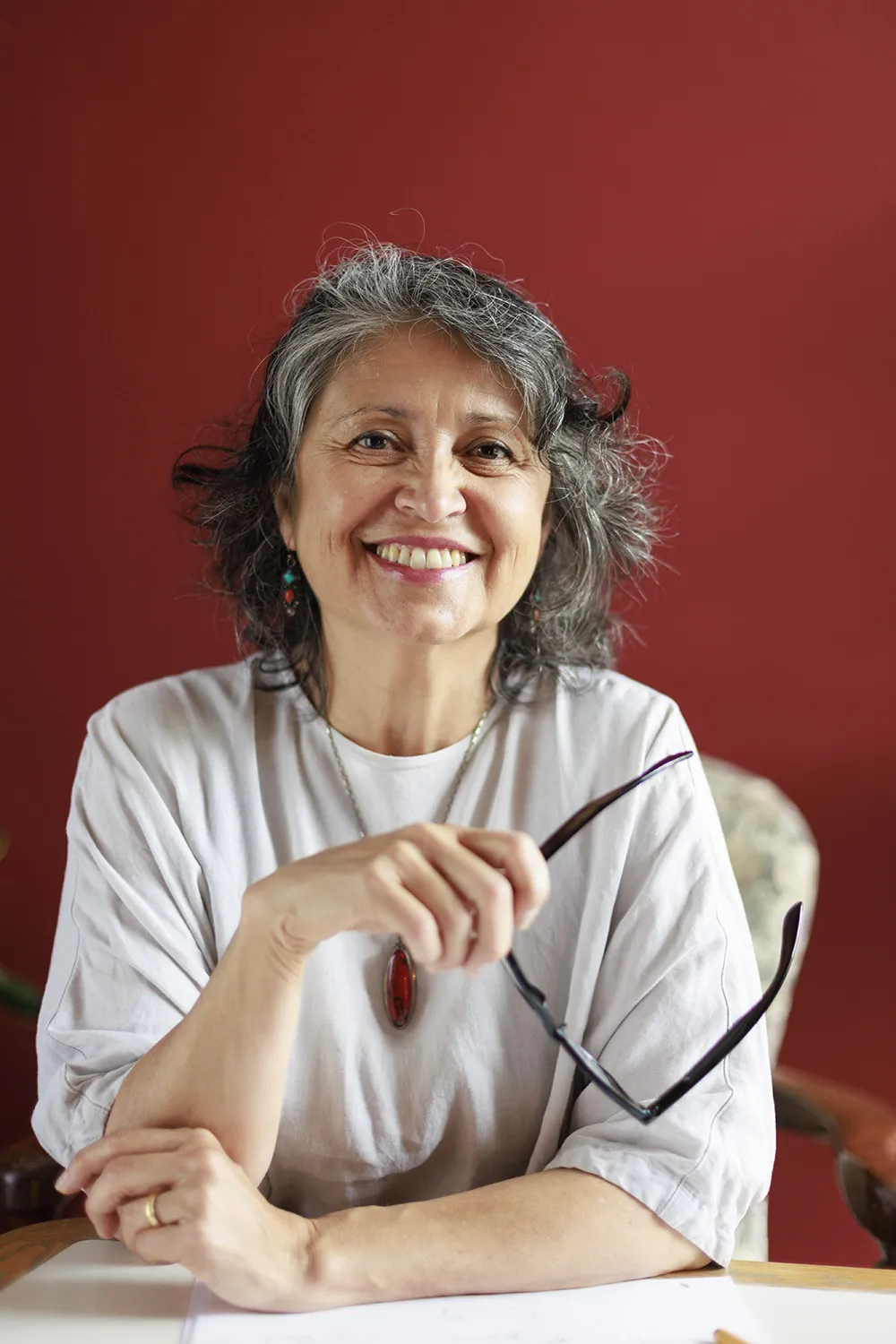Listening as a Radical Act
Playwriting Professor KJ Sanchez talks about her journey as a documentary theatremaker and her new book outlining best practices in the field

Theatre Professor KJ Sanchez is a playwright, director, actor and scholar whose work has been staged at theaters across the country, and she is the founder and CEO of her own theater company, American Records. Her most recent book, The Radical Act of Listening: Making Documentary and Investigative Theatre, explores best practices in the field of documentary and investigative theatre and offers readers a how-to guide for making their own work. We recently spoke with her about how her practice and scholarship informed her new book.
What does it mean to make documentary theatre?
For about 20 years now, I’ve been making documentary theatre. I interview people, transcribe those interviews and make plays out of those transcriptions. I run my own theater company called American Records, and my mission is to make work that chronicles our time, work that serves as a bridge between people. I consider myself a professional listener.
Many years ago, I was introduced to this genre of interviewing people and making work from those interviews, and I completely fell in love with it. I’ve made probably 25 plays about a lot of different subjects and different people, and I always believed that everyone had a beautiful story to tell as long as you took time to listen.
Tell me about the genesis of the book The Radical Act of Listening: Making Documentary and Investigative Theatre.
I always felt that I was passionate and in love with listening to both sides of every argument. And then as the political discourse in the U.S. started to divide people — most notably, in 2016 — I found myself,
for the first time in my career, struggling to listen to certain voices, and it was the first time that it had ever happened to me. I had a crisis of faith in my work because if I couldn’t be a professional listener, who was I?
And so, I decided to write the book as a way of revisiting what I loved about the art of listening. And as I did so, the title came to me: The Radical Act of Listening. Because as I revisited what I loved about listening, I realized that listening is one of the most radical things we can do. It’s hard. It takes practice. It’s a muscle.
My interest was not just to write a how-to-make-theater book, but I also look at some of my favorite listeners like talk show host Dick Cavett and the great oral historian Studs Terkel.

What do you hope readers take away from the book?
I think that there are some takeaways if you’re a teacher, if you’re a therapist, if you are an artist in another art form, or if you just want to be a better listener. I include some offerings for how to practice being a better listener. I also offer some recommendations of other listeners to listen to, to be a better listener.
What I love about the process is that it offers something for everyone, not just theater-makers. Taking time to set aside one’s own agenda, taking time to ask nonjudgmental, nonleading questions, can be helpful in many ways, in many vocations.
I sometimes recommend to my students to interview a grandparent because it’s a task where everyone finds that they hear things from a family member that they had never heard before. And so, if you just want to be an investigative listener in some avenue, the book has pro tips on how to do it.
What makes documentary theatre different from other forms of theatre, both in terms of process and the outcome?
A documentary play strives to not change the intention of the people it was based on, and a fictional play has invitation to have a character say anything for a purpose. When you’re writing a documentary play, you have to take a back seat to letting the event or the people tell you where the play wants to go. The play can have an emotional arc, but not necessarily a literal one, and the play ends up becoming more of a mosaic, hearing a lot of different voices.
People know it came from something real, and there’s always a pleasure in the idea that you can’t make this stuff up. Real life can be so much more interesting than fiction.
Can you share an example of how you’ve used these techniques to write a documentary play?
I tell the story of one of my very first plays about my hometown. I grew up in a town in New Mexico and was the last of 12 kids. My family had lived in the same town for 13 generations. We never crossed the border — the border crossed us. Our town was a land grant that was given from the Spanish Crown to my great, great, great grandparents and the other members of this community who were Sephardic Jews and Pueblo Indians and some European merchants, all pretending to be Spanish Catholic to get this property.
And so, when you were born, you inherited one share in this community, from this shared land grant, for hundreds of years all the way up till the time I was born. It started off as 250,000 acres of land, and when I was born, it was 47,000 acres of land that were shared by the townspeople of Tomé, New Mexico.
Then as I was growing up, a feud broke out over the rights to the land and what should be done with it. This feud affected every family in town, and my father was at that time the president of the Land Grant Corporation. Half of the town thought he was good and working to help the poor people of the town, and half the town thought he was untrustworthy.
And so, there was this divide in my town, and we’re not even a one-gas-station town. We’re a one-church town. We all go to the same Catholic church, and we’re all cousins. One faction sat on the left, and the other faction sat on the right so that you didn’t have to shake hands with your enemies during the “peace be with you” part of the service.
I returned to my community and interviewed elders of our town to ask them about the land. My mom’s family came from one side, and my dad’s from the other. Because I was in the middle and also because I had moved away and was seen as somebody from the outside, people felt comfortable talking to me. They told me about their experience with the land grant and also how they felt about my father, and I put it all into a play.
One of the things I’m most proud of in my entire body of work is that my mom said that after seeing the show, one of the matriarchs of the opposition called her up and invited her for a cup of coffee. I’m pretty skeptical of artists who say art heals and changes the world and all of that, but in this instance, it made a little bit of difference and it opened up a conversation. In that experience, I found new faith in the potential for art to be a bridge between people.
You work in this interesting space where you’re a playwright, you’re a director, you’re a scholar and an educator. What is it like balancing all these different parts of your portfolio?
It’s really great because I feel like we are in an era now that’s embracing the Renaissance Thinker. You know, a big part of my promotion process to tenure and then to full professor was about embracing the idea of being a “slasher.” I’m an entrepreneur/writer/actor/director, slash slash slash…
And our fields and our world are understanding that idea better than they have previously, and it’s one of the things that I think makes our Department of Theatre and Dance so strong. We’re really encouraging breaking down silos — yes, a person should be a scholar and a maker. I feel like my making makes me a better scholar, and my scholarship makes me a better maker.

